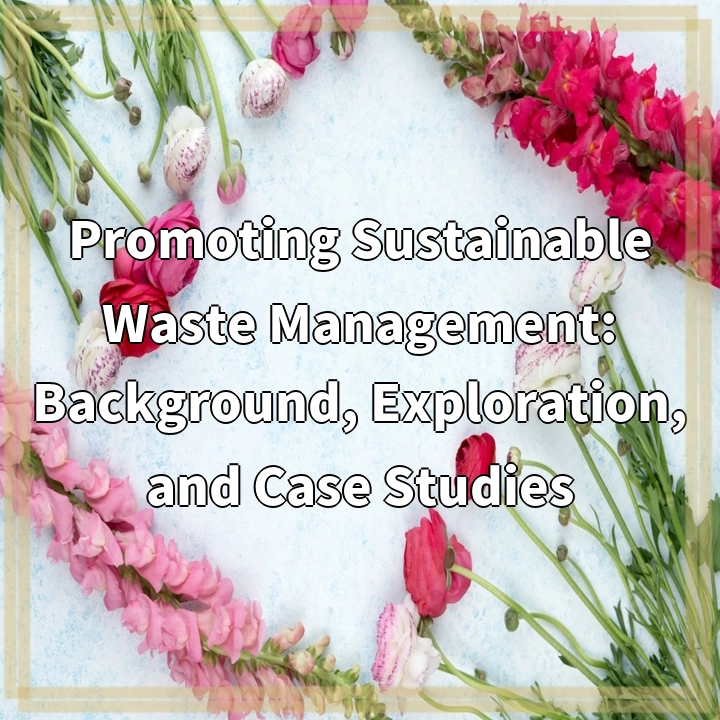
What is Promoting Sustainable Waste Management?
Promoting sustainable waste management refers to the implementation of strategies and practices that aim to reduce, reuse, and recycle waste in order to minimize its impact on the environment and human health. It involves adopting a comprehensive approach to waste management that prioritizes the preservation of natural resources, the prevention of pollution, and the promotion of a circular economy.
Real-World Problems Associated with Promoting Sustainable Waste Management
Despite the importance of sustainable waste management, numerous challenges exist that hinder its widespread implementation. These challenges include:
1. Inadequate Infrastructure
Many regions lack the necessary infrastructure to support sustainable waste management practices. This includes insufficient recycling facilities, limited access to composting systems, and an inadequate waste collection and transportation system. The lack of infrastructure makes it difficult to effectively separate and process different types of waste, resulting in higher volumes of waste being sent to landfills or incinerators.
2. Lack of Public Awareness and Engagement
Public awareness and engagement play a crucial role in promoting sustainable waste management. Unfortunately, many individuals are not aware of the environmental impacts of improper waste disposal or the benefits of recycling and composting. Insufficient education and outreach programs contribute to a lack of community engagement in waste reduction initiatives, making it challenging to achieve meaningful change at a societal level.
3. Economic Factors
Economic considerations can often pose barriers to sustainable waste management. The implementation of recycling programs and the development of new waste management technologies require financial investments. Inadequate funding and lack of financial incentives can discourage organizations and governments from prioritizing sustainable options and opting for cheaper, but less environmentally friendly, waste disposal methods instead.
4. Policy and Regulatory Challenges
Inconsistent or inadequate waste management policies and regulations can hinder the adoption of sustainable waste management practices. Overly complex regulations, unclear guidelines, and insufficient enforcement can lead to confusion and non-compliance, impeding progress in waste reduction and recycling efforts.
5. Plastic Waste Crisis
The global plastic waste crisis poses a significant challenge to sustainable waste management. Plastic pollution has severe environmental and health impacts, with large quantities of plastic waste ending up in oceans, rivers, and landfills. Addressing this crisis requires innovative solutions, such as promoting the use of biodegradable and recyclable materials, implementing effective plastic waste collection and recycling programs, and advocating for reduced dependence on single-use plastics.
Overall, addressing these real-world problems associated with promoting sustainable waste management requires collaboration between governments, businesses, communities, and individuals. It necessitates the development of supportive policies, investment in infrastructure, education and awareness campaigns, and a commitment to adopting sustainable practices at both a personal and systemic level.

Solutions for Promoting Sustainable Waste Management
To address the challenges associated with sustainable waste management, several solutions can be implemented:
1. Improve Infrastructure
Investing in the development of efficient waste management infrastructure is crucial. This includes expanding recycling facilities, establishing composting systems, and enhancing waste collection and transportation networks. By improving infrastructure, it becomes easier to separate and process waste more effectively, minimizing the amount sent to landfills or incinerators.
2. Increase Public Awareness and Engagement
Educating the public about the environmental impact of improper waste disposal and the benefits of recycling and composting is essential. Implementing comprehensive education programs and outreach initiatives can help raise awareness and encourage individuals to actively participate in waste reduction efforts. Engaging communities through workshops, campaigns, and incentivizing sustainable practices can foster long-term behavior change.
3. Foster Economic Incentives
To promote sustainable waste management, governments and organizations need to create economic incentives that encourage the adoption of environmentally friendly practices. This can include offering tax breaks or financial subsidies to businesses that invest in waste reduction technologies or providing financial support for the development of recycling infrastructure. By making sustainable options economically viable, organizations are more likely to prioritize responsible waste management practices.
4. Strengthen Policy and Regulations
Establishing clear and consistent waste management policies and regulations is essential for promoting sustainable practices. Governments should enact comprehensive legislation that outlines waste reduction targets, encourages recycling and composting, and incorporates extended producer responsibility. Adequate enforcement and monitoring mechanisms must be in place to ensure compliance and hold accountable those who fail to adopt sustainable waste management methods.
5. Encourage Plastic Waste Reduction
Addressing the plastic waste crisis requires a multi-faceted approach. Governments can implement policies that promote the use of biodegradable and recyclable materials, ban single-use plastics, and establish effective plastic waste collection and recycling systems. Businesses and individuals can support sustainable alternatives, such as using reusable products and reducing plastic packaging. Additionally, raising awareness about the impacts of plastic pollution and promoting responsible consumption can contribute to long-term solutions.
In conclusion, by implementing these solutions, it is possible to overcome the challenges associated with promoting sustainable waste management. Through collaboration between stakeholders, including governments, businesses, communities, and individuals, a more sustainable future can be achieved, with reduced waste generation, increased recycling rates, and a healthier environment for generations to come.















